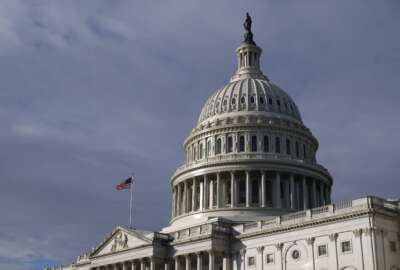Schedule F would make agencies ‘hard-pressed’ to meet national security threats
Former DHS and DoD officials said possible efforts to reimplement Schedule F would divert resources, stagnate progress and ultimately harm national security.
A possible return of the controversial Schedule F policy from the Trump administration would not only hurt the career civil service, but also diminish national security, former administration officials and other good government advocates warned Congress on Tuesday.
The previous administration’s plans to remove job protections from certain non-political federal employees and make them easier to fire would “drain” the federal workforce of expertise and institutional knowledge, Chairman Gary Peters (D-Mich.) said during a Senate Homeland Security and Governmental Affairs Committee hearing.
“It would slow down services, make us less prepared when disaster strikes and erode public trust in government,” Peters said. “Perhaps most importantly, it would weaken our national security and make us vulnerable to serious threats that continually face our nation.”
Although it’s been revoked for years, the idea behind the 2020 Schedule F executive order from former President Donald Trump has continued to hold the attention of lawmakers, federal employees, former officials, unions and many other stakeholders. Trump has promised to renew Schedule F or a similar type of policy if he wins the election in November.
Securing the U.S. border and responding to natural disasters, among other national security priorities, would become much more difficult if Schedule F is revived in a future administration, former officials from the departments of Defense and Homeland Security told committee lawmakers. Peter Levine, former DoD acting under secretary for personnel and readiness and former DoD deputy chief management officer, said career civilian employees touch virtually all aspects of national security and defense, including logistics, communications, acquisition and personnel.
“If you didn’t have that expertise, you’d be hard-pressed to get our service members paid, hard-pressed to get their families taken care of, and you’d be hard-pressed to equip and train our soldiers so they could operate in the field,” Levine said. “There is no aspect of the department’s operations that does not have DoD civilians embedded in it, and that relies on deep expertise. You could put in other people to do it, but without the expertise that you have there, I worry that the functioning would not be as good.”
When Trump first signed the 2020 executive order to create Schedule F, proponents of the policy said it was a way to ensure accountability of the career federal workforce, and give the president flexibility to remove poor performers in confidential, policy-determining, policy-making or policy-advocating positions. But Schedule F received immediate and strong backlash from critics who said the executive order was an attempt to politicize career civil servants, roughly 70% of whom work in defense and national security positions.
During Tuesday’s hearing, Elaine Duke, former DHS deputy secretary and former under secretary for management, said potential efforts to implement Schedule F or a similar policy would divert resources from national security, stagnate progress and ultimately harm DHS’ mission.
“The ability to carry out the mission would be eroded by not having enough people doing the mission and not having that institutional knowledge. Many of the career paths in the Homeland Security mission take years to train and develop,” Duke said. “You need that level of stability to effectively carry out the important missions in our homeland. And that turnover and that chaos that would be created [by Schedule F] would obviously detriment the capabilities and the skills of the mission workforce.”
Lawmakers on the committee also questioned the functionality of agencies in the case that at least 50,000 career federal positions could be converted into political roles. Currently, there are about 4,000 positions for which a president has to make political appointments.
“Adding at least 50,000 more political positions, as proposed by the advocates of Schedule F, I believe would undoubtedly result in a higher number of vacant positions at these agencies,” Peters said.
The Partnership for Public Service has reported that the thousands political appointments a president already has to make in an administration are tough to accomplish, leaving critical leadership vacancies across government. The problem is particularly challenging for the roughly 1,500 appointees that require Senate confirmation, which is an “increasingly difficult” process, said Jenny Mattingley, the Partnership’s vice president of government affairs.
“I’ve heard one former political appointee say it feels a little bit like [agencies are] in neutral gear because they do not have those top-level leaders in place to direct the policy of the incoming administration,” Mattingley said. “You also have people sitting in acting positions — and oftentimes when they’re acting, they’re wearing two or three hats, they’re doing three people’s jobs. That just makes it hard to make the longer-term decisions, makes it hard to think about reform, makes it hard to prioritize each of those individual jobs.”
At the same time, Mattingley acknowledged in her congressional testimony that reforms are necessary for improving performance accountability of career federal employees, but she added that investments in, and prioritization of, human resources and technology will be necessary to make that happen.
“If the goal is to actually ensure that agencies work effectively for the citizens, for your constituents, then what we need to do is actually look at the root management causes around this. Congress and this committee play an important role in looking at the whole talent lifecycle, which is part of holding employees accountable — hiring, employee development, performance management,” Mattingley said. “I think tackling some of those systems, making them easier, simpler, more transparent, would be a good step.”
The witnesses also raised concerns about how the likely churn of employees under a Schedule F classification would impact the continuity of federal operations between administrations. A higher level of turnover would be particularly harmful due to the lengthy process for filling political roles, which can often take up to a year for senior DoD positions, Levine said.
“The handful of political people who come into the department rely on those career civilians who have the experience, who can keep the lights on and keep things running during the period before they can get more political [appointees] in,” Levine said. “If instead of having to replace a few hundred political employees and being able to rely on the career employees, you had to replace 2,000, 3,000, 5,000, 10,000 — you wouldn’t be able to keep the lights on during that transition. You wouldn’t be able to run the building … You wouldn’t know who you could turn to, who you could rely on.”
The former DHS and DoD officials certainly aren’t the only ones calling for civil service reforms while also warning against the repercussions of a potential Schedule F revival. In June, a separate group of former national security officials made a call to action asking Congress to prevent the possible resurrection of Schedule F. In a letter to congressional committee leaders, the group proposed a different approach to reforming federal workforce accountability, while maintaining job protections and merit system principles for the career civil service.
There have also been questions around the breadth of Schedule F, and how many career federal jobs could be affected. The most common estimate is about 50,000 positions, but another estimate stemming from Trump administration documents placed it in the hundreds of thousands.
“The text of the executive order that created Schedule F is so open-ended that the limited boundaries are not reliable,” Tom Devine, legal director of the Government Accountability Project, said during the committee hearing. “The positions of confidential, policy-determining, policy-making or policy-advocating character — that includes employees who work on agency regulations, who have discretion in exercising legal functions, who engage in activities covered by the deliberative process, or work for or with anyone who is GS-13 or higher. Who else is left?”
Copyright © 2025 Federal News Network. All rights reserved. This website is not intended for users located within the European Economic Area.
Drew Friedman is a workforce, pay and benefits reporter for Federal News Network.
Follow @dfriedmanWFED





